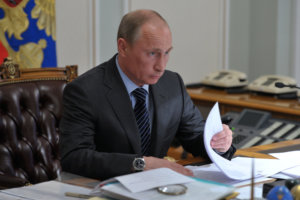Did Putin just pave the way for binary options advertising?
Whereas jurisdictions like France seek to curb advertising of risky bets like binary options by sports teams, Russia will permit this if the betting companies sponsor professional sports development.

As FinanceFeeds has said in previous articles, the status of binary options in Russia is shady. The Central Bank of Russia rarely if ever mentions binary options – the last time it did, it referred to them as a type of derivatives. This happened during a discussion on brokers’ activities and no particular mention was made as to whether binary options do constitute a part of the offering of securities brokers in Russia.
Another way of looking at binary options is as bets. Actually, even jurisdictions where binary options are treated as financial instruments, albeit ones associated with high risks, describe binary options as bets. The “bet” label has been used by regulators in Belgium, Canada and France, to explain what binary options are. It’s probably needless to say but let’s add that the UK regulator for binary options is the Gambling Commission.
Russia has no regulatory designation for binary options. But if one day it decides to introduce one, there will be two ways to go ahead – either treat binary options as bets/gambling/gaming instruments, or treat them as financial instruments/derivatives.
If it decides to label binary options as gambling instruments and bets, then, binary options brokers will have no problem with sports sponsorships and advertising in Russia.
Just a couple of days ago, on March 28, 2017, Russia’s president Vladimir Putin signed quite an interesting bill into a law. The document concerns advertising of gambling/gaming activities in Russia, and sports partnerships in particular.
The document (in Russian) introduces amendments to several Russian laws.
There are amendments to the law on advertising which permit advertising of all sorts of bets, gambling and gaming, during TV airing of sports games, racing, competitions, matches, etc., as long as this type of ads do not account for more than 20% of the permissible total duration of ads. Such type of advertising is permitted in all sorts of print media and periodicals dedicated to sports; also on Internet sites for sports. Advertising of bookmakers, providers of gaming/gambling services, is allowed on sports facilities (infrastructure like stadiums, etc.) and on wearables (clothing, shoes, etc) of sports teams and players.
Gambling operators, bookmakers, etc, making use of advertising deals with sports teams, have to allocate funds for sports events and sponsoring the development of sport activities in Russia. The whole sum of allocations (including but not limited to such advertising deals) should be not less than RUB 15 million. According to the document, 80% of the special-purpose allocations by gambling businesses should go for the development of Russian professional sports.
Two of the legal provisions in the document came into force along with its publication. The rest will become effective as of April 1, 2017.
The Russian approach comes in stark contrast with a trend spearheaded by France, where the financial markets regulator has made drastic steps to curb all sorts of sponsorships that promote high-risk financial products like binary options. A number of French football clubs have already complied with the restrictions and have terminated their partnerships with binary options brands. The Netherlands is also looking at a similar ban.
It will be interesting to see whether Russia’s professional sports teams will accept money from gambling companies. Is it a trade-off worth pursuing?









